These are the UK’s biggest grocery brands by value in the year to 31 December 2023, according to data from NiQ.
It’s been another tough year for suppliers. Of the top 100 brands, 97 have seen a rise in average price per pack – 66 by double digits
1 (1) Cadbury
Sales: £2,057.4m (+10.7%)
Cadbury is this year marking its 200th anniversary, reminding the nation of its storied history, not to mention the bulging archive of charming ads like the ones to the right and below.
On the face of it, the confectionery giant’s extra £200m in retail sales is also a cause for celebration, the biggest absolute increase in this report.
But it wasn’t driven by a sudden splurge in supermarket sweet aisles. It’s largely down to inflation. Cadbury is one of 66 top 100 brands to see a double-digit rise in average price per unit – up 17.8%.
However, the increase was a “last resort” fuelled by rocketing input costs, including record cocoa prices, insists Mondelez trade communications manager Susan Nash. “We are continuing to experience significantly higher input costs across our supply chain, with ingredients such as cocoa and sugar costing far more than previously,” she says.
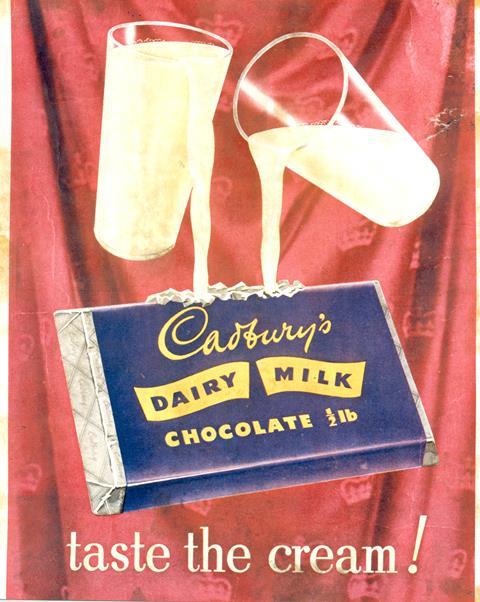
“Meanwhile, other costs like energy, packaging and transport also remain high.”
The result was UK shoppers tucking into fewer Cadbury treats. Volumes are down 6% – the equivalent of 85.8 million packs of chocolate, biscuits, snack bars, cakes, desserts and drinks. Of its 10 biggest-selling lines, worth 36.4% of overall value sales, only Heroes and Mini Eggs defied the downward trend in units – despite shrinkflation for the latter in March 2023.
The flagship Dairy Milk bar has seen volumes drop 4.7%, Dairy Milk Giant Buttons are down 10.3%, and Creme Egg shed 19.3% of units.
In response to these challenges, Cadbury has tapped occasions less likely to be affected by shoppers cutting discretionary spend.
One such area is seasonal events and gifts. There are more than 172 million gifting occasions through the year, according to the brand, and the chocolate category forms up to 20% of gifting options for the likes of Valentine’s, Mother’s Day and Father’s Day.
As part of its strategy to leverage these moments, Cadbury added White Creme Egg in late 2022. The return of Cadbury Coins in November 2023 – a product synonymous with Yuletide – was another attempt to tap festive spending, as was the return of Secret Santa Postal Service. It sent out 120,000 free chocolate bars in the run-up to last Christmas. (Conversely Egg ‘n’ Spoon cartons were discontinued last year.)
Sharing and multipacks was another area where pockets of growth remained. It provided opportunity for the brand’s best-performing NPD of the year. Twirl Xtra, added in February 2023, racked up nearly £10m in 11 months.
“Shoppers are continuing to look to enjoy evenings at home as a more cost-effective way to spend time together, and so we continue to play into this occasion,” says Nash.
Less impactful was Cadbury’s much-hyped attempt at non-HFSS innovation. Fruitier & Nuttier Trail Mix, rolled out in March 2023, has brought in just £2.6m.
Nevertheless, the brand has reiterated its commitment to healthier alternatives, Nash insists. “We have our patented technology that could lead to the creation of alternative versions of some of our much-loved chocolate and biscuit brands with the potential for up to 75% less sugar and fat and reduced calories.”
Which could be another excuse for celebration.
2 (2) Coca-Cola
Sales: £1,687.6m (+4.4%)
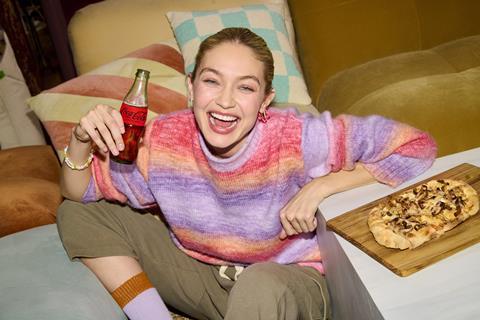
Attention-grabbing innovation was core to Coca-Cola’s efforts to re-engage shoppers last year, amid a 6.7% fall in volumes.
In February 2023, a collaboration with Spanish singer-songwriter Rosalía saw the addition of Move to its Creations lineup of limited-edition variants.
Its intention was to bring the “transformational power of music to life”, complete with videos, metaverse-inspired avatars and playlists – all via a simple QR code.
Y3000 followed last autumn – a Creations option designed using AI. It strived to offer a taste of how cola may be consumed in the next millennia “understanding how fans envision the future through emotions, aspirations, colours, flavours and more”.
Between them, Y3000 and Move mustered value sales under £500k. Owner Coca-Cola Europacific Partners GB is unconcerned. The aim of the sugar-free limited-editions is to create a halo effect for the brand’s wider portfolio, explains Rob Yeomans, VP of commercial development.
“Coca-Cola Creations is about much more than simply driving a short-term sales burst,” he says. “Our limited-editions get people talking about our brand and help us to engage new shoppers.
“One in five shoppers that bought our Creations over the past year were new to the Coca-Cola Zero Sugar brand, and there was a sustained volume sales increase for the overall brand in the months that followed each launch,” Yeomans adds.
It was a knock-on effect sorely needed by the brand’s core ranges. Coca-Cola Original Taste, Diet Coke and Coca-Cola Zero Sugar have sold 49.5 million fewer packs between them.
An 11.8% rise in average unit price saw shoppers “continuing to manage their spend during challenging times”, says Yeomans. The lousy 2023 summer also hurt sales.
Smaller lines have shown some promise, however. Coca-Cola Zero Sugar Zero Caffeine, unveiled in 2022, grew value 60.3%.
The nascent soda, Yeomans adds, “taps into the ongoing health and wellness trend that sees consumers moderating the consumption of certain foods or ingredients as part of a balanced lifestyle”.
3 (3) Walkers
Sales: £1,357.7m (+8.4%)
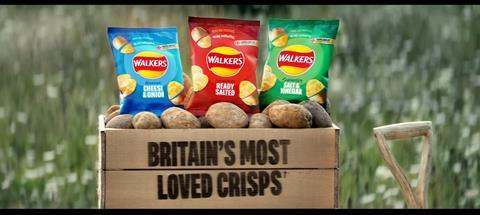
Walkers came under fire last year for price hikes and shrinkflation across its range, as its average price per unit grew 13.7%.
Shoppers responded by buying 43.4 million fewer packs of crisps and nuts. The brand’s core range fared worst, shedding 9.2% of volumes.
There were some positive stories for the UK’s third-biggest grocery brand, though. Its non-HFSS lineup added in 2022, 45% Less Salt, nearly doubled in value and increased volumes by 68.5%.
New flavours and formats have been a key part of the brand’s strategy, says Fiona Tomlin, chief marketing officer at owner PepsiCo. “The success we’ve seen is a result of adapting and meeting the demands of consumers.”
More Britain’s Biggest Brands:
-
Britain’s Biggest Brands 2024: The challengers
-
Where next for Britain’s Biggest Brands?
-
Britain’s Biggest Brands 2024: The risers and fallers
4 (4) Nestlé
Sales: £1,179.4m (+7.3%)
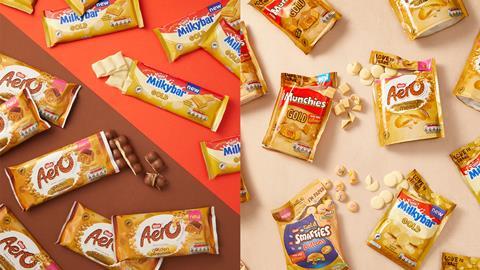
Nestlé is stretching its chocolate brands into new territories. Blonde extensions Milkybar Gold, Munchies Gold and Golden Aero have delivered £17.5m of the brand’s £79.9m growth since launch in February 2023. The April addition of Kit Kat Cereal has racked up £4.2m.
Nevertheless, overall Nestlé unit sales have slid 8.8%. Core Kit Kat, Aero and Toffee Crisp lines have contributed most to the decline in absolute terms. They’re down 18.3 million packs in total.
In cereal, big names like Cheerios and Shreddies have also shed major units.
Lines that aren’t measuring up had better watch out. Nestlé has already cut Caramac, Animal Bars and Breakaway in the past year.
5 (6) Warburtons
Sales: £867.0m (+13.5%)
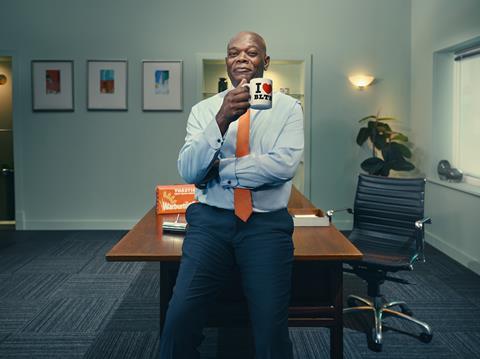
Samuel L Jackson as Jonathan Warburton? You better believe it. The Hollywood giant was great value as the Warbies chairman in September’s TV ad, kicking down doors and channelling Pulp Fiction fury.
The slot centred on the brand’s Toastie Loaf – part of a sliced loaf range down just 1.5% in volumes despite stiff competition from own label.
The diversity of Warburtons’ portfolio more than mitigated that small decline, registering strong volume performances elsewhere.
Its Crumpets, for instance, are up 7.7%, having benefited from the likes of TikTok, where recipes range from garlic crumpets to crumpet churros.
The brand’s creation of ‘National Crumpet Week’ in late 2022 and its April 2023 launch of Crumpet Thins also fuelled penetration, says Warbies sales director Colin Bebbington. In fact, those Thins have already shifted 6.7 million packs.
The brand’s Soft Pittas have done similarly well, growing volumes 18.4%. “The convenience of our pre-sliced Soft Pittas has really set them apart from traditional options and, as a branded proposition, supports value where private label had dominated,” says Bebbington.
Those same pittas sparked frustration in early 2023, when social media users noticed packs had been cut from five breads to four, with the rsp remaining changed. The move was the result of “feedback from consumers” on how best to pass on soaring input costs, Warburtons explained.
More controversy followed in October, when Defra said bakery brands using the word ‘wholemeal’ to market 50/50 loaves could be forced to relabel. Bebbington insists Warbies’ Half & Half loaves are “labelled in line with all relevant legislation, giving consumers clear information on the ingredients as required”.
6 (5) Pepsi Cola
Sales: £816.1m (+4.9%)
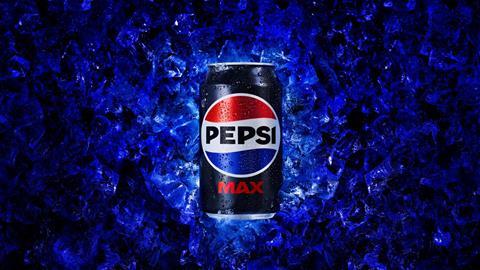
A rejuvenated Pepsi brand is hitting UK shelves – with the aim of providing a much-needed uplift to the soft drink’s fortunes.
The brand has sold 20.4 million fewer units in the past year. Pepsi Max, which accounts for 80.8% of total revenue, managed to keep on an even keel, with a marginal drop in volumes of 1.1%.But Pepsi Cola and Diet Pepsi didn’t fare nearly so well. They’ve shed £25.7m and 17.5 million packs between them.
The bulk of that value loss, £18.2m, is down to Pepsi Cola, which slashed its sugar content by half in March 2023.
It looks like the brand overhaul – backed by a multichannel campaign spanning TV, radio and OOH – will have its work cut out.
7 (7) Heinz
Sales: £797.0m (+9.6%)
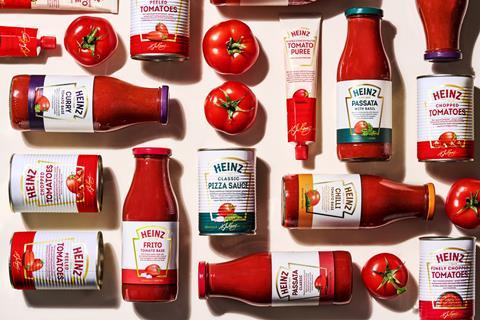
Value growth at Heinz was driven by the fourth-biggest average price increase in this year’s report. It’s up 29.3% –which reflects soaring costs for the likes of tomatoes, edible oils and energy, says Heinz.
That’s had an inevitable effect on unit sales. They’re down 15.2% – or 70.6 million packs – as shoppers traded down to cheaper alternatives.
In the second half of the year, the brand shifted its focus to volumes by stepping up promotional activity. The strategy is starting to work, says a Heinz spokesperson, with volumes up across core categories since Christmas.
Canny NPD is another weapon in its arsenal. Last year it debuted lines such as the Culinary Tomatoes range and Tomato Ketchup Pickle.
8 (8) Purina
Sales: £750.2m (+8.8%)
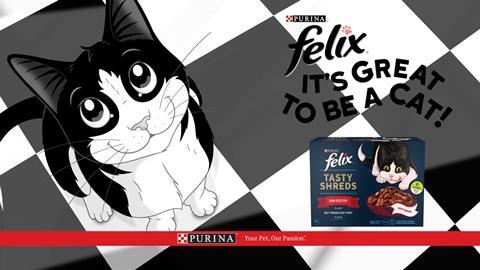
Petfood’s top brand is worth an extra £60.9m. But that’s largely inflationary; units have fallen 4.4%. Purina’s core catfood contributed most to this loss. Felix As Good As It Looks, Felix and One Bifensis are down 15.8%, 17.8% and 21.1% respectively.
There’s still news to set tails wagging, however. Bakers has seen value surge 7.6% on units up 6.4%. That’s thanks in part to the August launch of lines to tackle dogs’ digestive upsets. Indulgent catfoods Gourmet Revelations and Mon Petit are also in strong growth.
October saw the debut of One Dualnature, Purina’s first carbon-reduced petfood. “We believe the health of our environment is as important as providing high-quality petfood products,” says Purina.
9 (9) Red Bull
Sales: £680.1m (+17.5%)
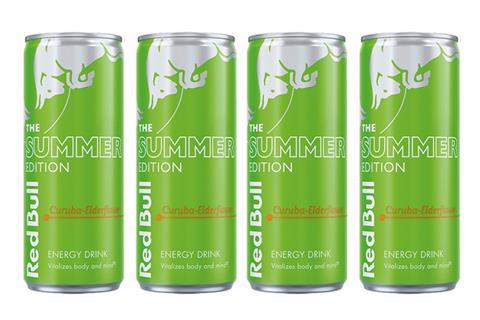
There’s a Monster in Red Bull’s rear view mirror. The former brand (10) is now less than £70m behind the latter, having grown value and volumes at a faster rate.
In a bid to widen the gap, Red Bull is banking on its innovation pipeline – such as Curuba Elderflower Summer Edition unveiled last month.
It joined the energy giant’s Editions offer that makes up 8% of value sales – from 4.7% the previous year. Highlights include Juneberry Summer Edition, which has brought in £11.2m, while Red Edition added £2.3m.
But Editions is still dwarfed by Red Bull’s core drink across regular and sugar-free. They’ve added a combined £81.9m and shifted 19.1 million more packs.
10 (13) Monster
Sales: £611.8m (+22.3%)
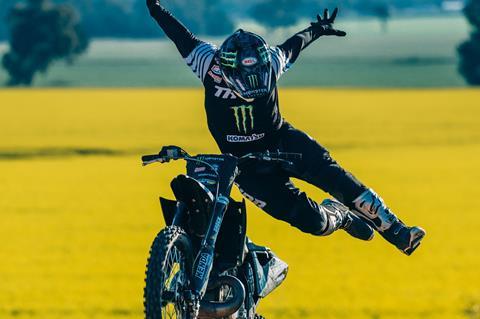
Prime (64) generated most column inches in sports & energy drinks last year. But it was Monster that snuck away with 25% of the additional £400m spent on the category last year – helping the brand’s revenues fizz up by £111.4m.
Its Juiced and Ultra ranges deserve most credit. They’ve added £37.9m and £22m respectively and grown a total of 22.9 million packs. The duo is now worth a combined £314.7m, after adding Juiced Aussie Lemonade and Ultra Rosa in February 2023 – which have already racked up a combined £41.2m.
Such are the performances of Juiced and Ultra that Monster’s core Energy subbrand is now only the third-biggest in its lineup. It’s worth £130.3m, having added £10.3m and grown volumes by 0.5%.
More success followed in September, when the brand added Zero Sugar – its “biggest launch in 20 years”.
That’s according to Helen Kerr, associate director for portfolio development at Coca-Cola Europacific Partners GB, which makes and distributes the Monster portfolio.
Zero Sugar promises the same taste as Monster’s established drinks but with no calories. It’s already worth £5.4m, says Kerr.
“Largely thanks to Monster, energy drinks have become more mainstream, offering the choice and great taste of soft drinks but with added functional benefits,” she adds.
These changing perceptions mean the category is now far more evenly split by gender, Kerr explains. Women comprise 41% of sports & energy consumers – and the drinks are now a socially acceptable option at multiple times of day.
Still, Monster hasn’t forgotten its long-standing fanbase of gamers. It’s continued its partnership with the Call of Duty franchise, and players of Modern Warfare 3 and Warzone are currently able to unlock a free Monster skin.
11 (10) Birds Eye
Sales: £607.6m (+8.5%)
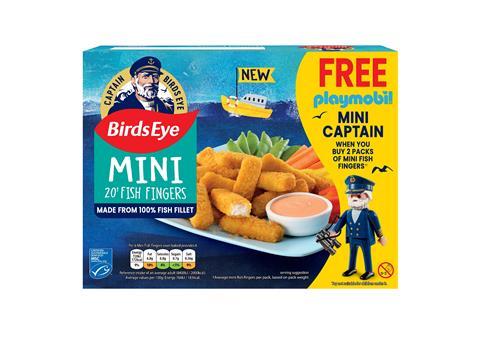
Birds Eye’s six bestselling lines are in volume decline. It’s a sign of the overall brand’s fortunes: units have slipped 7.7% on a 17.6% rise in average price per pack. Still, value is up £47.5m and the brand hammers home the appeal of lines like its new Mini Fish Fingers.
“Frozen food has always played an important role for shoppers, offering longer shelf-life and easy portion control, which can help reduce food waste and allow budgets to stretch further”, says marketing director Jim Shearer.
12 (12) Lucozade
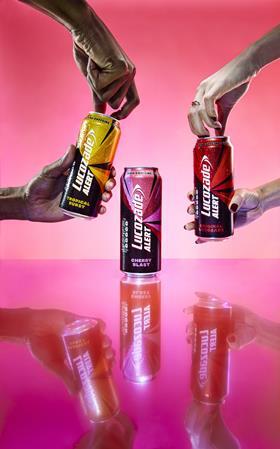
Sales: £567.5m (+9.7%)
Lucozade has been replaced by Monster (10) as Britain’s second-largest sports & energy drink. That’s despite the brand racking up a £50m gain and holding on to its volumes.
Across the portfolio, it’s a more mixed picture. The core Sport and Zero ranges are up 6.1% and 10.2% in volume. But Energy, Lucozade’s biggest seller, is down 7.6% after the August reformulation of its Original and Orange variants.
This year will see the brand embark on a blitz of blue NPD across Energy, Sport and Alert.
13 (11) Kellogg’s
Sales: £537.0m(+3.2%)
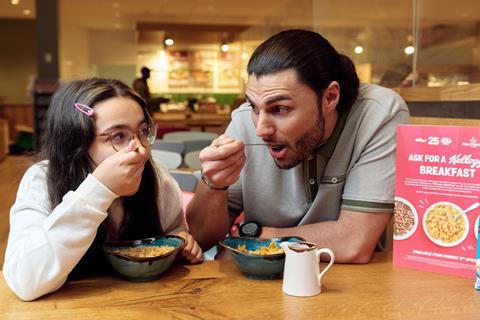
Kellogg’s top 10 cereals have all taken a hit to unit sales. The likes of Crunchy Nut, Corn Flakes, Special K and Coco Pops have shed 9.3 million packs in total. The brand’s overall portfolio is down 5.7% by volume.
That’s due to “a number of obstacles” facing the category, says Kellanova revenue & channel director Andy Williams, “from branded volumes declining to HFSS restrictions playing out”.
Nevertheless, an average price rise of 9.4% meant Kellogg’s was able to grow value by £16.8m. Although Williams insists “we’ve absorbed some cost pressures where possible to avoid us passing all additional costs on to the shopper”. And with the high cost of living making own label cereal more appealing, “we’ve remained committed to the value our portfolio adds”, says Williams. He points to on-pack promotions such as last year’s ticket giveaway for Merlin Entertainment’s attractions.
A key event of 2023 was the 25th anniversary of Kellogg’s School Breakfast Club Programme. It was marked in March by ‘Better Days Are Built on Breakfast’, a documentary-style ad. That same month, a partnership with Morrisons kicked off to see free bowls of cereal reach kids during the Easter holiday.
This year, the focus has so far been on NPD. In January, Kellogg’s added Corn Flakes Chocolate as a Tesco exclusive – promoted with a pop-up ‘Corn-er Shop’ in Manchester. Recent months have also seen the launch of Krave Choco Brownie, available in Asda and supported by sampling and micro-influencer activity.
14 (15) McVitie’s
Sales: £520.6m (+14.4%)
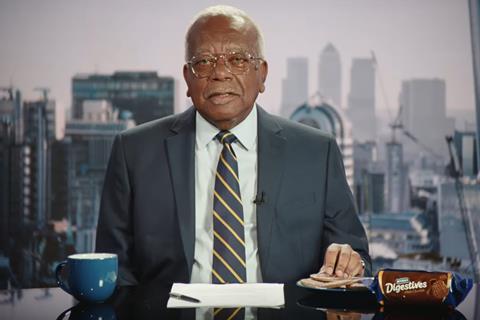
“McVitie’s is the category’s uncontested number one,” says marketing director James King. “We’ve invested heavily in the category via one of our biggest masterbrand campaigns to date.”
Nevertheless, some of McVitie’s top-sellers have seen volumes slide. Digestives, Jaffa Cakes, Chocolate Hobnobs and Rich Tea all lost ground in the past year.
Overall, the brand is down 7.3 million packs. But value is up £65.6m – due mainly to higher average prices.
15 (14) Nescafé
Sales: £486.6m (+4.5%)
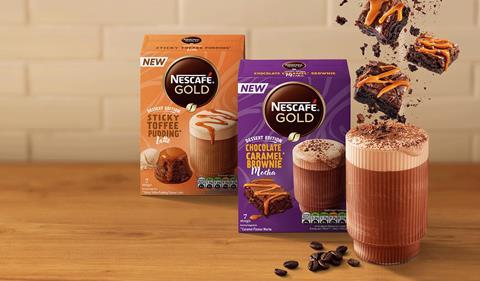
Nescafé’s £20.9m gain is down to higher prices. It’s sold 12.7 million fewer packs, while closest rival Kenco (76) is up in both value and units.
Hence Nescafé’s major rebrand, unveiled in January. “Coffee enthusiasts have emotional connection with the brand and we’re confident our refreshed new look will resonate with them,” says marketing director Sophie Demoulin.
“We want to demonstrate we are dedicated to delivering exceptional coffee experiences.”
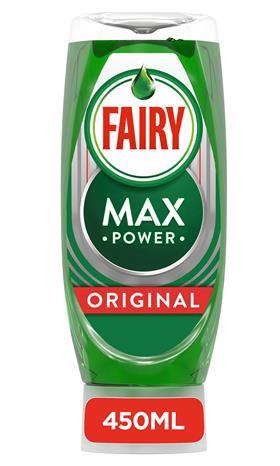
16 (20) Fairy
Sales: £470.8m (+21.7%)
P&G’s Fairy is cleaning up. It’s added £83.8m, the seventh greatest gain in this report. And it’s one of only five top 20 brands to have sold more units. They’re up 11.2%.
That’s an especially impressive performance given own label has been wiping the floor with many household cleaning brands.
“At P&G, we stick to our business model,” says VP for sales Ian Morley. It’s a model “grounded in superiority of product, packaging, communication, retail execution and value for customers and consumers alike – because we know that it works”.
Morley points to demand for Fairy Non Bio Outdoorable, in fabric conditioner and scent-booster bead formats. Added in 2022, it aims to give the freshness of line-dried washing to clothes dried inside.
“Rising energy bills mean consumers are less inclined to use their tumble driers but remain concerned that air-drying leaves clothes with a musty smell,” he says.
“By developing Fairy Outdoorable, we’ve solved new-found tensions and pivoted in-store PoS to match.”
Outdoorable managed to add £7.3m last year on triple-digit volume growth.
Only Fairy Liquid and Fairy Max Power – the washing-up liquid launched in an upside-down bottle in early 2022 – have delivered greater gains. They’re up £50.1m and £13.5m respectively.
“It’s not all about the new,” adds Morley. “Our fabric and homecare brands have continued to nurture their longstanding influencer partnership with cleaning sensation Mrs Hinch, in order to further drive their success.”
17 (16) McCain
Sales: £468.7m (+11.6%)

McCain’s been on-trend of late. That’s evident from its November innovation, Baby Hasslebacks, and its choice of comeback queen to front the line: Sophie Ellis-Bextor.
The product is 653g of pre-sliced, skin-on mini-spuds and a flavour sachet of sea salt & cracked black pepper.
It’s “one of the biggest” launches in years for the frozen potato brand, says category director Naomi Tinkler. The aim is to provide “products that feel homemade whilst offering convenience”.
18 (18) Arla
Sales: £450.0m (+10.3%)
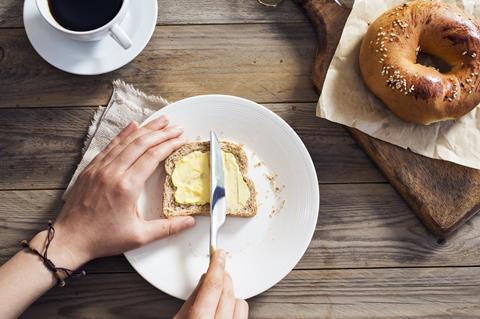
Arla’s volumes are back in growth. They’re up 7.3%, meaning it’s recouped the majority of the 8.1% loss we reported last year.
This was driven by big unit sales for the likes of Protein yoghurt, Jörd and Big Milk. They’re up 51.2%, 20.7% and 20.4% respectively.
The dairy co-op points to promotional activity as key to that turnaround. In June, it launched its first masterbrand TV ad, playing up themes such as sustainability and its ownership by farmers.
19 (19) Andrex
Sales: £442.5m (+10.5%)

Even in a cost of living crisis, Brits are reluctant to compromise on loo roll. That’s helped Andrex add £41.9m on units that have dipped just 0.5% – and its posher lines are gaining share.
“Growth is not only from inflation,” says marketing director Matt Stone. Rather, he points to “premiumisation as added benefit and quilted segments increase share”.
He cites strong performances for the brand’s longer-lasting Mega Rolls and Supreme Quilts, in particular.
20 (17) Müller
Sales: £433.5m (+5.9%)

Müller attributes its 5.7% fall in volumes to the “understandable impact” of the cost of living crisis as shoppers “look at ways to make every penny go further”.
As average price per pack grew 12.2%, key sub-brands Corner, Light and Rice shed a total of 10.8 million units.
But Müller insists it remains “one of the nation’s favourite dairy brands, found in over half of fridges”. It also expanded its lineup with retro yoghurt variants and its first plant-based yoghurts last year.
21 (22) Danone
Sales: £386.2m (+4.3%)
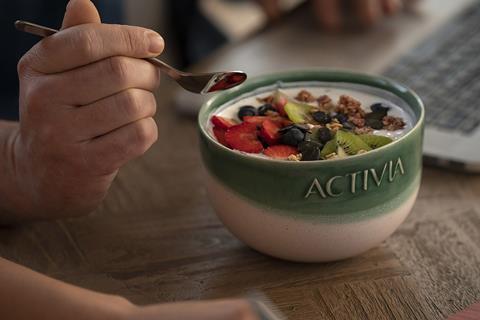
“The ongoing cost of living crisis, coupled with inflation, has created a challenging environment for our brands from a volume perspective over the last 12 months,” concedes George Bates, head of category development at Danone Yoghurts UK&I.
These challenges have led to a relatively modest value boost for Danone – one that hasn’t masked a fall in volumes. The masterbrand suffered a 9.2% drop in unit sales in 2023. That’s 16.9 million fewer packs of yoghurt pots, yoghurt drinks and cottage cheese sold.
This performance is reflected in the core Actimel range, Danone’s biggest seller. It’s shed 5.4% of its units in the past 12 months.
But Bates stresses sales in recent weeks have been encouraging. The sub-brand has registered 4.8% volume growth, slightly ahead of the category’s 3.5%.
“We expect functional health to continue to be a key growth engine for the category in the future,” he says.
It’s this expectation that led Danone to make its debut in sports nutrition in September with the GetPro brand.
Comprising drinks, puddings, mousses and yoghurts, the 11-strong range of high-protein goods was “the most significant NPD from Danone in recent years”, said category marketing director Tom Hickton at the time.
With an eye on tapping other health trends, Danone added Activia Fibre pots during the summer in Walnut & Oats, Apple & Cereals and Muesli. It also expanded its Actimel brand with a trio of vitamin-enriched Actimel Plus yoghurt shots.
22 (21) Lurpak
Sales: £368.9m (–1.5%)
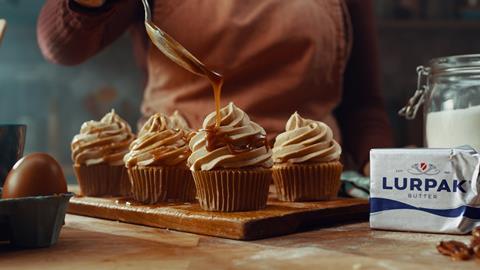
As average prices have fallen 5.2%, shoppers have returned to the UK’s biggest BSM brand.
Lurpak’s volumes are up 3.9%, driven by its switch to smaller pack sizes last summer. The move “enabled us to deliver the best price and product for our shoppers – during a time when shoppers were looking for value for money”, says owner Arla.
Next up is likely to be the hotly anticipated debut of a plant-based spreadable variant, which aims to “attract a new, younger consumer”.
23 (24) Lindt
Sales: £363.6m (+7.2%)
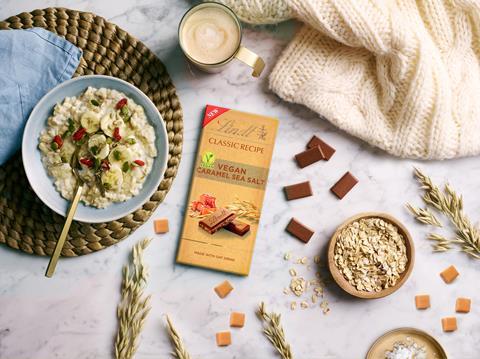
Lindt’s value has bounced back from the hot summer of 2022. However, its £24.4m gain is largely down to a 13.3% rise in average price.
Like rival chocolate brands, Lindt has faced historic spikes in cocoa prices as well as significant increases in milk and sugar costs. Against this backdrop, units have fallen 5.4%.
On the plus side, it’s seen a rise in gifting at key occasions such as Easter and Christmas, and a Choco Wafer range in August bolstered its “permissible indulgence” lineup.

24 (23) Hovis
Sales: £362.8m (+2.7%)
In a challenging environment for wrapped bread, Hovis has suffered a 10.5% loss in volumes. That’s 28.8 million fewer packs.
Average price per pack is up 14.8%, reflecting higher input costs and more premium goods in its portfolio.
Hovis’ artisanal Bakers Since 1886 range has grown 35% in value, says commercial director Alistair Gaunt. It added a Rustic Bloomer trio in September to “tap the consumer appetite for elevated at-home meal occasions”.

25 (26) Pringles
Sales: £321.5m (+13.2%)
A focus on a wider spectrum of snacking occasions helped Pringles boost volumes by 5.6%, says senior brand activation manager Beth Johnson.
Pushing the brand’s small can has been part of this strategy. “We’ve identified opportunities in out-of-home occasions, such as pubs and further education,’’ she adds.
Already this year, Pringles has rolled recyclable paper tubes into Tesco – and it’s relaunched its Sizzl’n lineup as Hot to tap “demand for spicy sub-ranges”.
26 (25) Fanta
Sales: £313.3m (+7.1%)
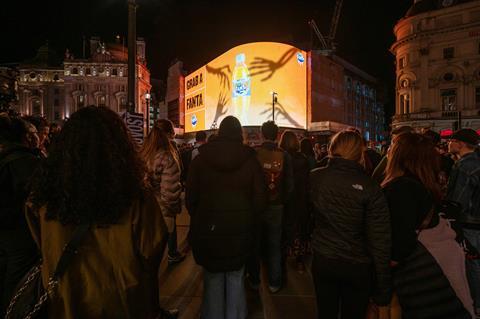
Classic carbonates like Fanta have faced an uphill battle when pitched against the flurry of agile challengers hitting the soft drink aisles.
In fact, the brand sold 6.3 million fewer units last year, and value growth was only driven by an 11% rise in average pack price.
But Fanta “remains a popular choice”, insists Rob Yeomans, VP of commercial development at owner CCEP GB. “Significant marketing investment over the past year” has raised its profile, he adds.
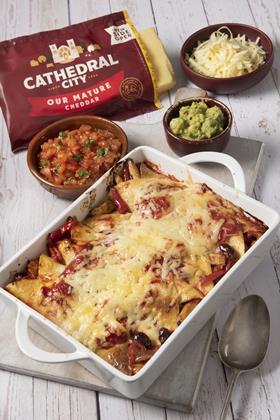
27 (27) Cathedral City
Sales: £301.3m (+12.6%)
After a big slump in volumes in last year’s report, Cathedral City has bounced back into unit growth of 3.2%.
It follows a “serious investment” in NPD, says Neil Stewart, head of marketing for cheese at brand owner Saputo Dairy UK. That includes the launch of the Best of British range, which housed Cathedral City’s first smoked product, Our Naturally Smoked Cheddar.
The brand has also stepped out of its cheddar heartland with Our Red Leicester.
28 (29) Innocent
Sales: £284.4m (+10.9%)
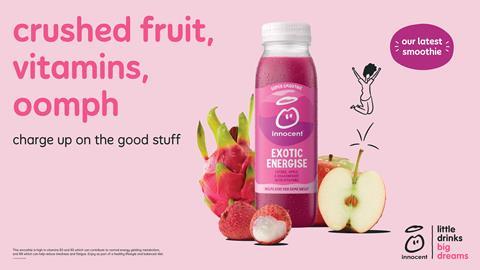
Innocent dubbed 2022 “perhaps its most challenging year” ever. In 2023, things looked more promising.
Sales of its smoothies and juices grew in both value and volume – 2.8 million more packs went through tills.
Lines offering additional functional health benefits were “particularly successful”, says Innocent MD for UK & Ireland Sam Akinluyi.
The brand has been innovating on this front with the rollout of Exotic Energise Super Smoothie in summer.
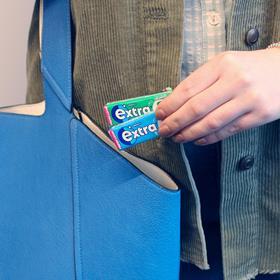
29 (32) Wrigley’s
Sales: £274.2m (+16.7%)
Many confectionery brands have come unstuck in the past year due to HFSS regulations rendering impulse fixtures in larger stores off limits.
Not Wrigley’s. It’s added £39.2m for its portfolio of sugar-free gum, while units have dipped just 0.8% – driven in part by greater share of those impulse fixtures.
Fruity NPD is also playing a part. The brand launched Strawberry Lemon Extra Refreshers last June and followed up with the launch of Extra Watermelon last month.
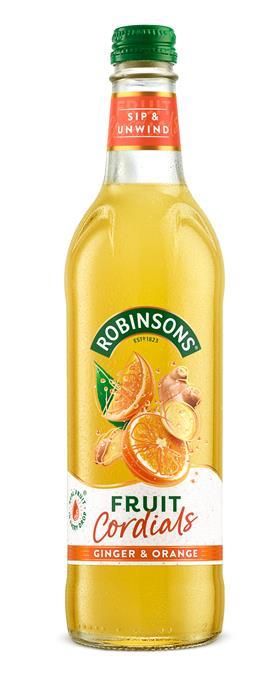
30 (28) Robinsons
Sales: £273.1m (+2.1%)
March 2023 saw fruit squash leader Robinsons unveil its first major rebrand in nearly 10 years.
The makeover of its core offer was intended to “reinvigorate the market”, said owner Britvic at the time. The distinctive new look would give the lineup a “modern identity” after 200 years in Brits’ homes.
The restorative effect of the snazzy overhaul is yet to kick in. Robinsons’ volume decline has slowed, but only a little since the 4.8% loss we reported last year. In the past 12 months, units fell 4.4%.
It was, therefore, higher prices that accounted for a £5.5m gain.
Robinsons’ modest performance puts the brand on par with many rivals, as concerns about sugar, a poor 2023 summer and the growing lure of own label create a perfect storm of challenges for the squashes & cordials category.
The brand – which in 2022 ended its 86-year relationship with Wimbledon – is hopeful there are emerging trends it can utilise to reverse its fortunes.
“With the increasing emphasis on health in recent years, shoppers are on the lookout for added vitamins or ingredients to support health – with almost two-thirds of shoppers saying they are interested in beverages with a broad range of functional, better-for-you benefits,” says Ben Parker, retail commercial director at Britvic.
To leverage this demand, the brand rolled out Robinsons With Benefits in May. The three-strong range of posh squash boasts a variety of health benefits, from reducing fatigue to supporting immunity.
31 (30) Doritos
Sales: £270.9m (+7.4%)
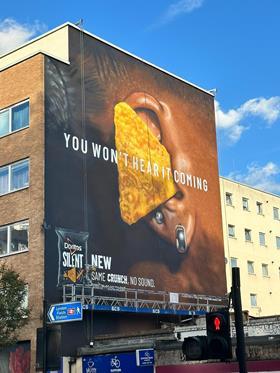
Doritos has turned to headline-grabbing NPD and bold marketing to reverse its volume decline.
The PepsiCo brand’s down 7.3%, after barely staying in the black in last year’s report.
Thrifty shoppers picked up 13 million fewer packs of Doritos chips and dips in 2023, as average price per unit shot up by 15.9%.
To tempt back snackers – especially gen Z – the brand first sought to inject excitement through novel flavours. In late 2022, it added pizza-inspired variants.
Soon after, in March 2023, it teamed up with Burger King to deliver Flame Grilled Whopper chips, promising the smoky tang of the fast food chain’s bestseller. Doritos hailed it as one of its most successful launches to date.
The brand also took an offbeat approach to marketing to ward off the threat of own-label sharing bags.
See November’s Doritos Silent app (pictured), billed as “groundbreaking ‘crunch-cancellation’ technology that lets PC gamers enjoy their favourite chips without distracting other players”.
“The disruptive campaign included PR, OOH and digital advertising and saw over 10,000 consumers download the technology within the first few months in the UK,” says PepsiCo marketing director Lee Houston.
Early 2023’s push was similarly (and literally) bold. ‘For the Bold in Everyone’ invited Brits “to rethink personal biases and embrace their passions”. It featured Colette ‘Dancing Granny’ Zacca, who went viral after grooving in her undies at the 2019 Notting Hill Carnival.
32 (35) Haribo
Sales: £268.3m (+21.6%)
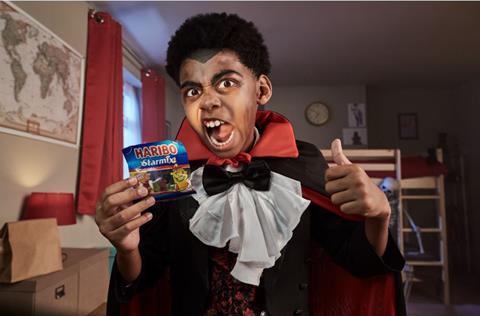
Haribo’s £47.6m gain was driven by a 22.8% rise in average unit price. However, volumes have fallen just 1%.
Marketing has been key to limiting the decline. Last year’s ‘Monster Approved’ push provided a list of “suitable treats to help make Halloween a little bit happier”.
The brand also boosted its portfolio with Funtasia, Box of Happy and Awesome Axolotls, to bring “excitement into confectionery” and “create more moments of childlike happiness”.
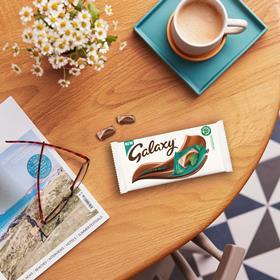
33 (34) Galaxy
Sales: £258.1m (+15.9%)
The UK’s third-largest chocolate brand has added an extra £35.4m to its top line.
And it’s succeeded where bigger rivals have failed – by shifting more packs. Volumes have grown 0.3%, while Cadbury (1) and Lindt (23) have seen units decline.
Galaxy’s growth is no mean feat given the increasing costs and regulations facing confectioners. Keen pricing, the July launch of Smooth Mint and a TV ad pledging to “help a million people, including women” by 2030 all helped.
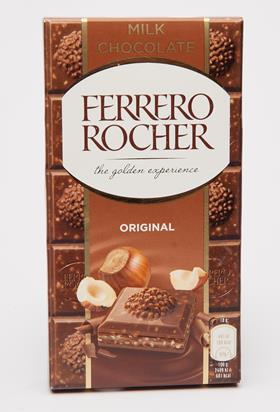
34 (36) Ferrero
Sales: £238.2m (+15.4%)
Hazelnuts have been in short supply as a commodity, leading to soaring prices.
So it’s no surprise average price per pack has increased by 12.6% across the hazelnut-heavy Ferrero portfolio.
Units have held up against that pressure – up 2.5% across its brands, which include Nutella and Rocher.
Ferrero is now looking to new categories to accelerate sales. In March 2023, it launched three handheld ice creams in Ferrero Rocher and Raffaello variants.
35 (40) Whiskas
Sales: £230.9m (+23.5%)
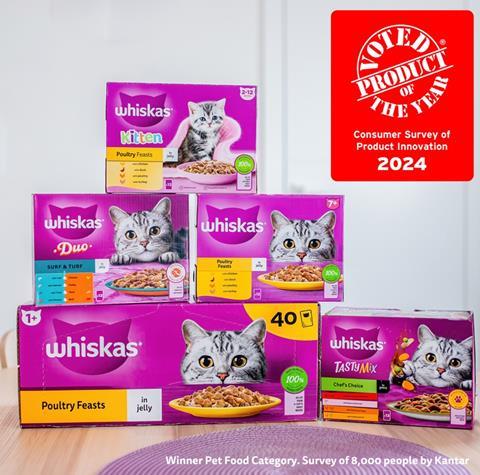
Whiskas’ value is up £43.9m, while units have slipped just 1.1%. No wonder brand owner Mars Petcare is upbeat.
The February 2023 relaunch of Whiskas’ single-serve wet food drove 9.2% volume growth in its pouches in the 12 weeks to 7 October, says category & market activation director Adelina Bizoi.
“As part of the relaunch, we introduced two new sub-ranges, Whiskas Duo and Tasty Mix, to offer both new and existing shoppers even more choice for their cats.”
36 (31) Magnum
Sales: £230.3m (–3.6%)

Britain’s biggest ice cream brand “has proven itself to be the category leader when it comes to NPD”, insists brand manager Daniel Lythgo.
He highlights the likes of Magnum Double Starchaser and Mini Double Caramel Collection, both added in January 2023.
Marketing also took a front seat last year, as volumes fell 9.6%. The full Magnum Mini lineup was backed by “a strong campaign in Q1 & Q4” – an investment of more than £8m, Lythgo adds.
37 (33) Alpro
Sales: £230.0m (–0.6%)
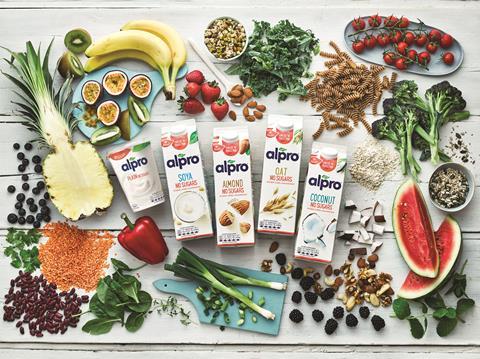
Alpro is faring much better than this time last year, when we reported a value decline of 9.1%. But this year’s flat volumes hide an ongoing source of concern: Alpro has shifted 16.5 million fewer packs.
This performance is illustrative of a difficult year for the alt-dairy market. Budget-conscious shoppers put fewer packs of dairy-free milk and yoghurts in their baskets, as average unit prices soared across the category. Alpro, the biggest player, is 12% pricier.
“Inflation and the cost of living have tempered recent growth rates,” Tom Kerr, head of category management for dairy & plant-based at Alpro owner Danone, confirmed in January.
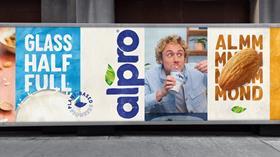
In a bid to reverse its position, the brand teamed up with Michelin-trained chef Poppy O’Toole – self-professed “potato queen” and social media star – to host a five-course breakfast in London.
The March event in London’s Fitzrovia featured “the UK’s first plant-based breakfast tasting menu” at £5 per person. Proceeds were donated to FoodCycle, a community-focused food charity.
The one-off brekkie was designed to get consumers to be more adventurous in their morning meals.
“Adding simple taste twists, like introducing plant-based products to your breakfast, helps us shake things up in a delicious way,” says Zoe Gardner, senior brand manager at Alpro.
The brand also shook up its image with a new look in September. It featured larger on-pack photography, a “tailored hand-cut font”, and a more playful tone in its messaging.
38 (37) Maltesers
Sales: £228.5m (+13.6%)
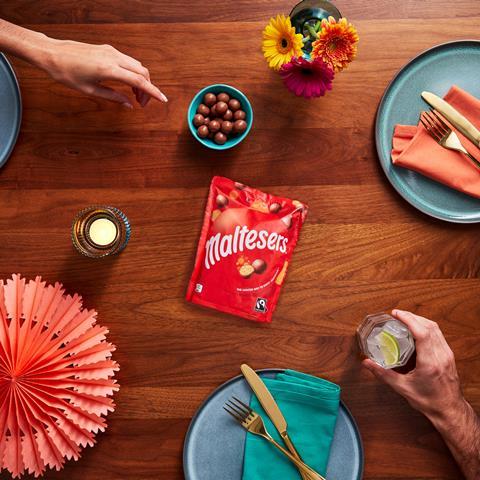
Maltesers kicked off its ‘Motherlovers’ push in June. Banging the drum for working mums, it told of the challenges they face through on-pack messaging and the ‘Let’s Lighten the Load’ platform online.
The brand also rolled out packs and Advent calendars of Assorted Truffles for Christmas, as well as the Tesco-exclusive Maltesers Mint Truffles.
The brand’s year ended with a £27.3m gain on units down just 1.6%.
39 (39) Jacob’s
Sales: £207.6m (+5.7%)
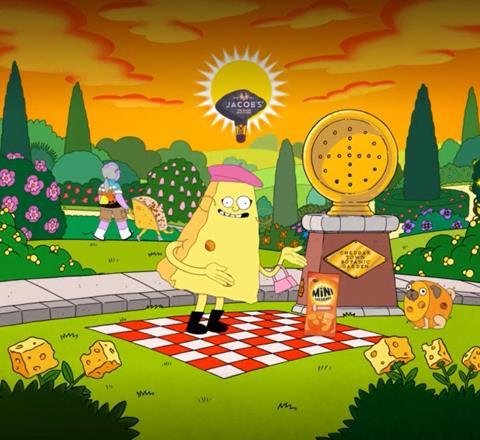
Jacob’s value gain comes despite a 7.1% volume decline. Owner Pladis is banking on healthier options to help recoup units.
“In 2023, shoppers were hungry for lighter versions of their favourite snacks,” says Asli Akman, Pladis marketing director for healthy & social sharing, pointing to the launch of an HFSS-compliant Jacob’s Crinklys recipe in July.
Crinklys Cheese & Onion was the second-highest retail value sales launch of 2023 in non-HFSS, she adds.
40 (46) Evian
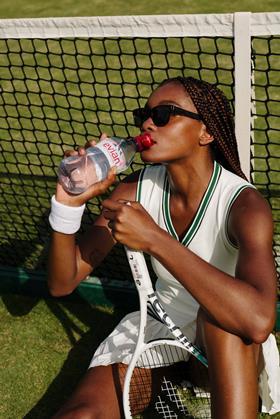
Sales: £196.9m (+11.9%)
As wet weather in 2023 dampened summer sales, Evian shed three million packs.
The high cost of living also had a deleterious effect. “Inflation is easing… but shoppers are still feeling pressures,” Danone category development head Charlotte Andrassy said last month.
There are some positives, though. While sales of higher-priced sparkling and flavoured waters have declined year on year, Danone notes value sales of plain still water are up 10.3%.
41 (47) Yeo Valley Organic
Sales: £193.8m (+10.9%)
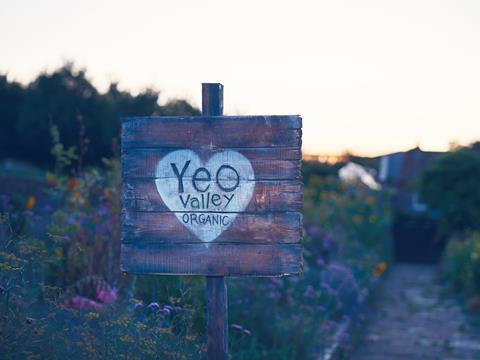
Yeo Valley Organic last month returned to TV screens for the first time in 10 years.
With volume sales down 5.1 million packs of yoghurt, butter and the like, the Bristol dairy supplier kicked off ‘Delicious is at the heart of everything we do’. It’s a £3m push that focuses on the brand’s West Country provenance.
For the ad, the brand partnered with Scottish punk band Skids, who rerecorded their 1979 hit ‘Into The Valley’ as ‘Into Yeo Valley’.
42 (52) Starbucks
Sales: £192.7m (+14.2%)
The enduring power of the Starbucks brand in the UK prompted an extra 100 stores to open in 2023 – several within Sainsbury’s supermarkets. That same power drove a £23.9m gain for Starbucks in retail, as an extra 11.2 million branded packs were sold.
In the year of its fifth anniversary, the $7.2bn “global coffee alliance” between Starbucks and Nestlé delivered a “continued strong performance” across instant, grounds and the like, Nestlé says. Starbucks by Nespresso was a key driver of growth, after bringing out a spate of NPD last year – including limited-edition Toffee Nut and Blonde Decaf for “additional afternoon occasions”.
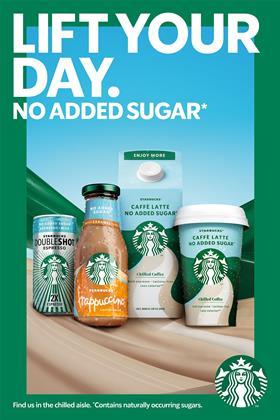
Starbucks’ ready-to-drink lines – manufactured, distributed and marketed by Arla Foods – are also buzzing.
RTD coffee occasions at home and on the go “is no longer a trend but a new, permanent consumption habit”, says Adam Hacking, Arla’s head of beverages.
“As a brand, we respond to consumer consumption habits and harness trends to feed our innovation and attract shopper interest.”
That approach saw the extension of the 750ml Starbucks Multiserve range to include Skinny Latte in March 2023. The launch “tapped into the consumer trend for less sugar in favourite products”, Hacking says.
The demand for less sugar also prompted the launch of the Starbucks Doubleshot Espresso No Added Sugar multipack. It gives “loyal shoppers a more convenient and accessible way” to enjoy a healthier espresso “for a quick uplift at home”.
43 (44) Volvic
Sales: £192.1m (+6.3%)
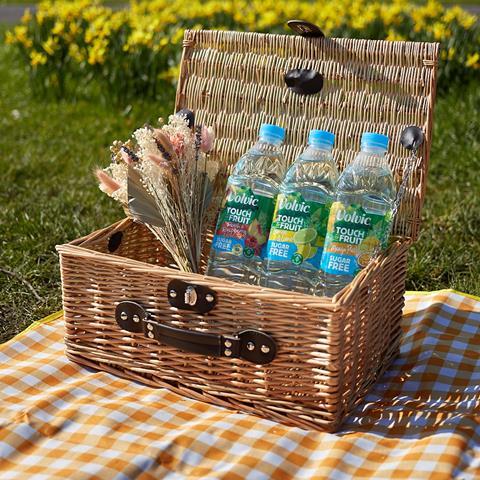
Like sister brand Evian (40), Volvic took a hit in 2023. Units are down by 12.8 million after 2023 failed to deliver a hot summer.
But owner Danone sees a silver lining. “Small multipacks are the fastest-growing format across the market, and they are driving volume – particularly in convenience multiple,” senior category manager Olivia Meadows recently said.
Danone is also looking into greening its packaging. It’s pledged to move to 100% rPET on Volvic and Evian by 2025.
44 (57) Kinder
Sales: £190.5m (+21.8%)
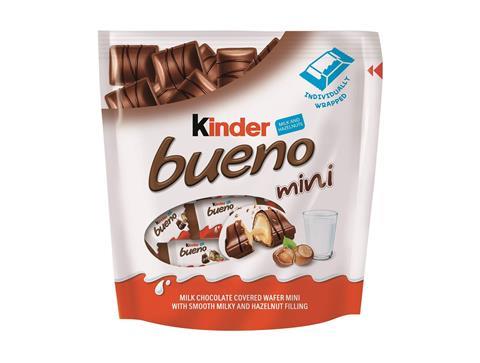
Kinder is a rarity among chocolate brands. It’s grown both volume and value despite the restrictions on merchandising HFSS goods in store.
The brand’s up £34.2m after shifting an extra 7.6 million units of Surprise, Bueno and the like. Easter was a key driver of sales, with the return of “familiar favourites” such as Kinder Egg Hunt Kit.
In October, the brand ran an on-pack push timed to the release of the movie Wonka. Prizes included family breaks in London and cinema tickets.
45 (54) Lenor
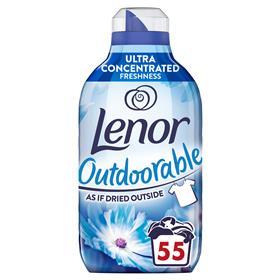
Sales: £187.2m (+15.5%)
Lenor still smells of roses despite big gains for own-label laundry products. Owner P&G says the 2022 launch of Outdoorable, designed to give line-dried freshness to clothes dried inside, has helped drive growth of £25.1m.
That’s not just down to pricing; an extra 1.7 million packs were sold. Promotions helped in that department. “Retailer partnerships have enabled us to reframe the concept of value to consumers in more discretional categories,” says P&G sales VP Ian Morley.
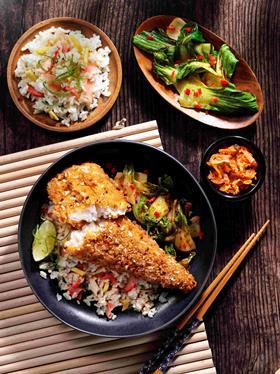
46 (43) Young’s Seafood
Sales: £185.5m (+0.7%)
Young’s Seafood has managed to offset unit declines of 14% with an average price increase of 17.2%, thereby keeping value in the black.
The brand continued to focus on its posher Gastro range, launching lines throughout the year to attract Brits swapping eating out for meals at home.
Last month, Young’s unveiled the trendy Taste of Asia lineup in frozen, aiming to “add a delicious twist to midweek meals and inspire new consumption occasions”.
47 (58) Hula Hoops
Sales: £186.3m (+20.2%)
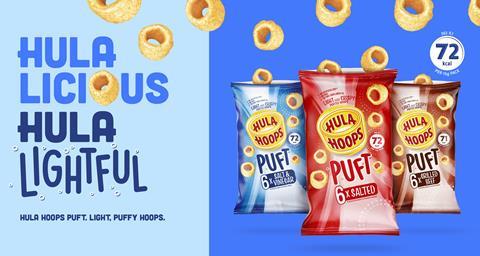
Hula Hoops added a Cheese & Onion variant to its Puft range in August, in a continued push of its “light and low-calorie offering”. And, as shoppers become “increasingly health-conscious”, it has big ambitions to build on its 7.6% volume growth.
It’s just reinvested in its ‘Hula Licious, Hula Lightful’ campaign, which debuted in January 2023, to bolster brand awareness. It’s also set to “drive the brand with consumer and shopper activity” throughout 2024.
48 (42) Weetabix
Sales: £185.8m (–0.1%)
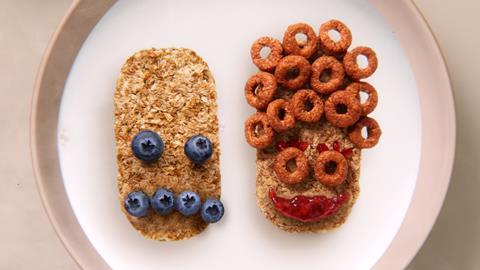
Weetabix invested in sustainability in 2023, making 100% of its packaging recyclable and shouting about its use of local wheat. That didn’t stop Brits picking up cheaper cereal; the brand’s volumes have fallen 8% on prices up 8.5%.
But Weetabix has worked to mitigate inflation, keeping price rises below category average, says marketing director Francesca Theokli.
While other major brands have lost share, Weetabix’s household penetration remains flat, she adds.
49 (41) Persil
Sales: £185.7m (–0.3%)
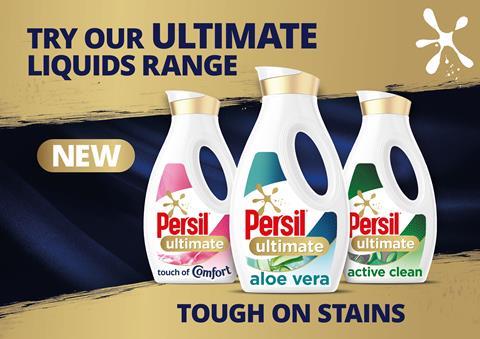
Persil’s 10.1% volume loss is illustrative of post-pandemic declines across the laundry category.
But while Persil is down 2.9 million packs, it “remains one of the leading fabric cleaning brands, trusted by 6.2 million homes”, says Nadine Slyper, laundry marketing director at owner Unilever.
“Science and technology remain at the forefront of the innovation pipeline,” she adds, pointing to the spring 2023 rollout of the premium Persil Ultimate Liquid range.
50 (45) Mr Kipling
Sales: £183.3m (+2.4%)
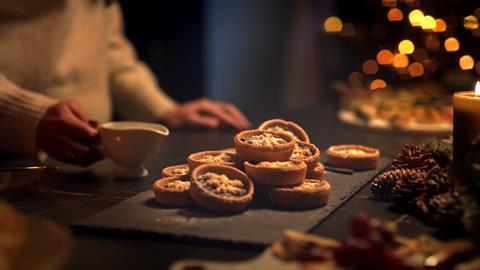
In the new year, rumours circled of Brits falling out of love with mince pies. Sales of the festive staple had dipped across the mults, as shoppers traded up to posher options like panettone.
For Mr Kipling owner Premier Foods, this was no cause for concern. The supplier “saw a strong customer response to the new Mr Kipling Signature Collection Best Ever Mince Pies”, says Naomi Shooman, global marketing director for sweet treats. That demand “contributed to Premier Foods selling nearly 190 million mince pies last year – four million more compared to the year before”.
Festive success aside, the big story of Mr Kipling’s 2023 is inflation. Average price per unit rocketed 28.6%. Only five brands in this report have seen prices rise faster. Predictably, higher prices were accompanied by a steep fall in volume sales: Mr Kipling has shifted 24.7 million fewer packs. The clampdown on HFSS goods in stores no doubt played a part in this decline, too.
To combat the effect of those HFSS restrictions, Mr Kipling has grown its non-HFSS Deliciously Good range. In May, it brought out a Loaf Cake range in Banana, Lemon and Caramel; Cherry Bakewells followed in October.
Mr Kipling is also working “to create excitement in store, with exceptional displays and major partnerships”, Shooman says. “This includes our partnership with the Minions franchise, with limited-edition packs.” Meanwhile, Mr Kipling slices have been part of Premier’s efforts to tackle inflation by “lowering promotional prices across a number of major branded products”.
51 (49) Pedigree
Sales: £179.2m (+3.7%)
Units are down 9.1% for Pedigree, as own label attracts thrifty shoppers and Purina Bakers (8) appeals to dogs with sensitive tums. March 2023 saw the launch of the Pedigree Multivitamins range – to fill “a gap in the market for soft-chew dog supplements”, says the brand.
52 (62) McCoy’s
Sales: £177.4m (+18.4%)
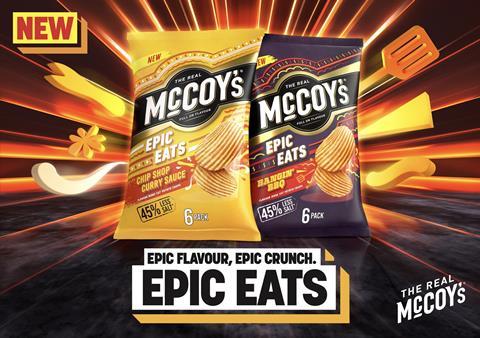
McCoy’s has been hot on NPD this year. Chip Shop Curry Sauce and Bangin’ BBQ followed the Epic Eats range in Nacho Cheese and Spicy Salsa. “Our strategy for Epic Eats is to introduce new flavour rotations and exciting activations to keep consumers engaged,” says owner KP Snacks.
53 (50) Charlie Bigham’s
Sales: £176.3m (+3.0%)
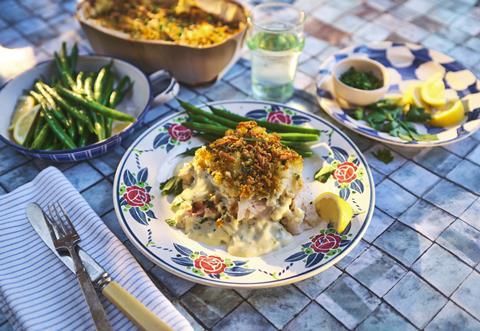
Bigham’s has “had to pass on significant price increases”, says CEO Patrick Cairns. That’s required extra comms. “Premium brands have to prove that, whilst they may be more expensive, they offer great value for money.” Hence the kickoff of its animated campaign in January.
54 (61) Dr Pepper
Sales: £174.3m (+15.0%)

Dr Pepper attributes its £22.7m gain to “new-look packaging, eye-catching campaign activity” and an overhaul of its sugar-free variant.
They’ve helped the brand buck the trend of volume declines across the flavoured carbonates market. It’s sold an extra four million units, after kicking off the ‘Try More Weird’ push last summer.
Dr Pepper’s first campaign in a decade encouraged consumers to “embrace their weird quirks and the things that make them brilliantly wacky”.
The push was accompanied by a major rebrand that added “contrasting swirls and vibrant colours”.
To coincide with the makeover, Dr Pepper also changed the name and taste of its zero-sugar soda. The refreshed Dr Pepper Zerooo is up 16.6% in value on volumes up 5.6%, says the brand.
“With its unique flavour and brand personality, Dr Pepper has an incredibly loyal fanbase and has remained resilient during a time where shoppers are being careful how they spend,” adds Rob Yeomans, vice-president of commercial development at Coca-Cola Europacific Partners GB, which distributes Dr Pepper.
55 (51) Dairylea
Sales: £173.5m (+2.0%)
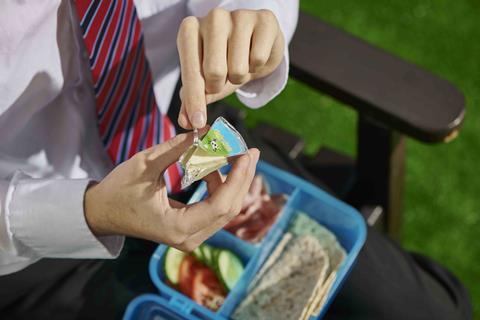
Dairylea has been an “iconic staple since 1950”, it says, and continues to appear on half of UK families’ shopping lists. But volumes have dived 11.7% as average price per pack has risen 15.5%. The brand is now focusing efforts on snacking, hence its July relaunch of Lunchables as Lunchers.
56 (63) Batchelors
Sales: £171.9m (+17.1%)
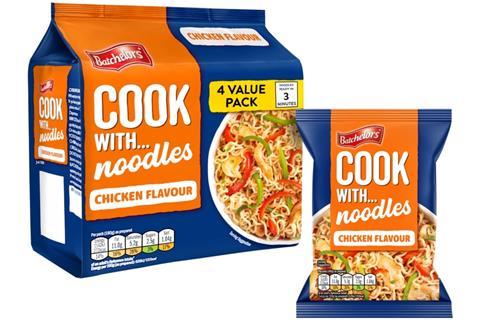
Batchelors teamed up with Warner Bros last year to mark the release of Shazam! Fury of the Gods. An on-pack promo ran across Super Noodles, Pasta ‘n’ Sauce and Cup a Soup. The brand’s own superpower is offering “cost-effective hot lunches”, it says. But volumes are down 9.3%.
57 (55) Quaker
Sales: £170.7m (+7.6%)
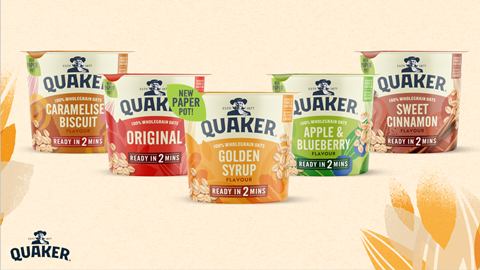
Like other cereal category brands, Quaker has struggled to compete with own label rivals. Its volumes are down 12%, while its extra £12m was driven by price rises. Quaker hopes pushing new protein-enriched variants and non-HFSS indulgent flavours will drive a comeback.
58 (53) Richmond
Sales: £168.8m (+2.5%)
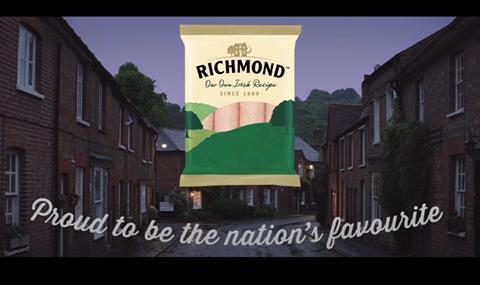
Richmond says its volumes have been hit by consumers “tightening the purse strings amidst continued inflation”. It’s seen 1.9 million packs wiped out. Nevertheless, the brand is “continuing to see success”, it adds, particularly in plant-based, where it added Meat-Free Minis last April.
59 (60) Ariel
Sales: £167.2m (+9.0%)
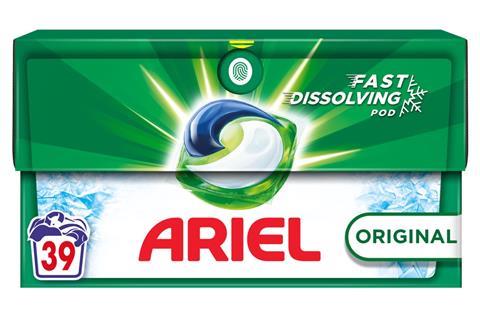
Ariel is keeping its head above water in a laundry category that is getting rinsed by own label. Higher prices are the chief driver of its £13.8m gain. But the brand’s kept a tighter lid on prices rises than rival Persil (49) through loyalty card deals. That’s helped hold on to units, which are up 0.2%.
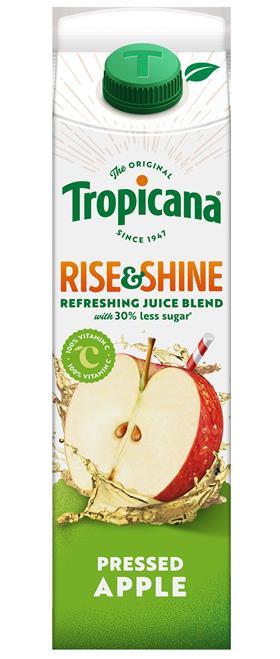
60 (38) Tropicana
Sales: £163.3m (–18.5%)
The decision by Co-op to delist Tropicana at the start of 2023 proved a serious blow for the brand. It was compounded by a swing to cheaper own label chilled juices, as shoppers looked to lower their grocery budgets. The brand saw £37.1m wiped out and unit sales tumble 25.1%.
61 (66) Buxton
Sales: £159.5m (+14.2%)
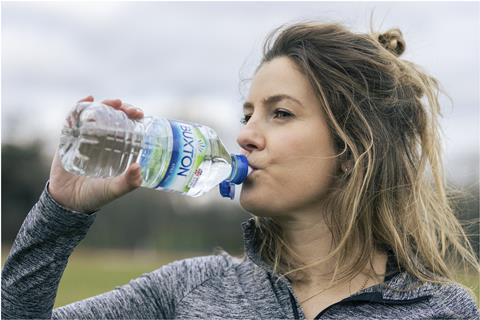
Buxton was one of the big winners in our 2023 report, growing its top line by over 50%. This year’s value rise is modest by comparison, driven by an 18.1% increase in average price per pack. Unit sales are down 3.2% after disappointing summer weather that hit all water brands in the top 100.
62 (59) Highland Spring
Sales: £158.7m (+3.3%)
Highland Spring is no longer the third-biggest water brand. It’s lost its spot to Buxton (61) after shedding 2.2 million packs. This year, it plans to use its ‘Water As Nature Intended’ messaging to highlight the “untouched, organic land” from which its water is sourced.
63 (68) Hellmann’s
Sales: £158.0m (+14.8%)
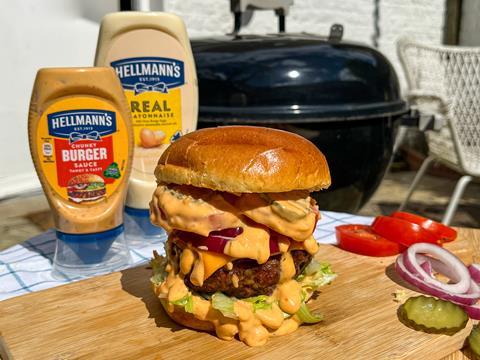
A 21.5% rise in average pack price has driven a £20.4m gain for Hellmann’s. Last year, it moved its top-selling product, Real Mayonnaise, to a 100% recycled squeezy bottle. “The aim is to help shoppers make sure their mealtimes are more sustainable,” says owner Unilever.
64 (160) Prime
Sales: £156.8m (+1,681.7%)
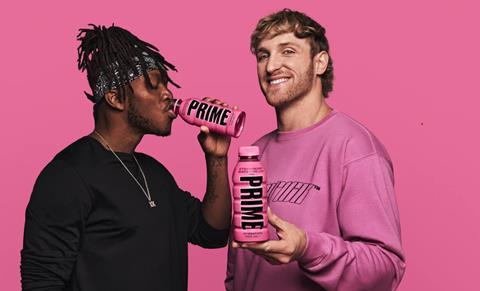
No other brand had a 2023 quite like Prime – which has rocketed into the top 100 with a £148m gain. That’s the second-biggest in absolute terms, after Cadbury (1).
Spotted in c-stores in the new year priced at up to £18 for its £2.99 Hydration drinks, the US sports & energy sensation soon bagged listings with Tesco, Sainsbury’s, Morrisons and Co-op.
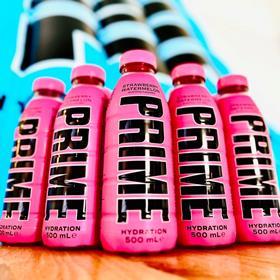
Such was the initial demand for Prime that Sainsbury’s was forced to temporarily limit Hydration sales to three bottles per customer in January 2023, to ensure stocks lasted.
Social media accounts cropped up dedicated to the brand – founded by YouTubers Logan Paul and Olajide ‘KSI’ Olatunji (pictured) – and store and distribution centre insiders fed real-time data to Prime Tracker UK. It’s an app that directs users to shops where the drinks are in stock.
The April launch of a caffeinated Energy range further helped to maintain the hype.
In a bid to keep it going even longer, Prime has hinted – through Intellectual Property Office applications – at moves into sports nutrition, vaping, alcohol, personal care and even CBD.
The brand’s moment isn’t over yet.
65 (48) Schweppes
Sales: £156.1m (–9.7%)
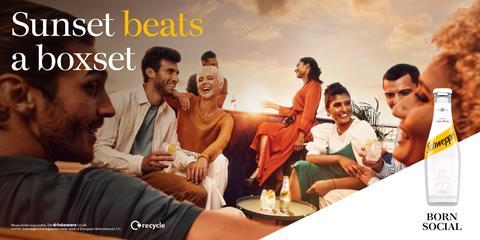
Schweppes has struggled to recapture the sales boom that accompanied lockdowns. For the second year in a row, value is down – this time by £16.7m. But the brand says it has plans to revive excitement for at-home mixology via the appointment of new brand ambassadors and innovation.
66 (70) Chicago Town
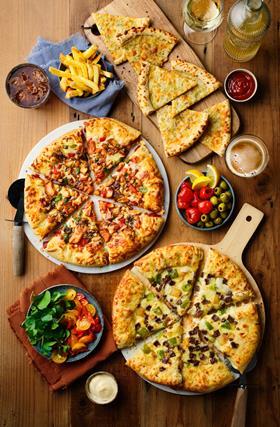
Sales: £155.2m (+14.7%)
Innovation has been at the heart of Chicago Town’s gains. Units are up 3.3% after the addition of two premium Deep Dish lines and the vegan Pepper-no-ni with a garlic & herb stuffed crust last year. The leading pizza brand also invested more than £4m in marketing activity.
67 (74) Bisto
Sales: £154.0m (+15.1%)
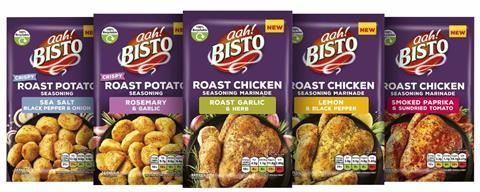
There’s little evidence of hard-up Brits staying at home for their Sunday lunch in Bisto’s performance. The brand’s volumes are down 11.2%, equating to 7.3 million fewer packs. In a bid to recoup sales, Bisto last summer added a range of seasonings for roast chicken and roast spuds.
68 (56) Quorn
Sales: £153.6m (–3.0%)
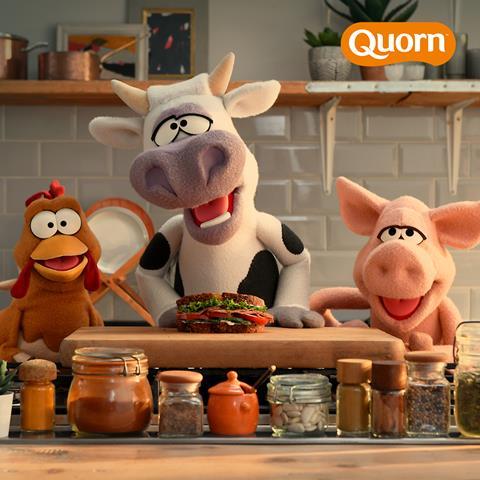
Despite its 8.9% fall in volumes, Quorn says it still accounts for almost a third of total meat-free sales – because “nobody innovates and engages quite like us”. In March 2023, it claimed a first with a frozen sharing pie, as it plans to offer more family-friendly launches.
69 (71) Rowntree’s
Sales: £148.8m (+10.3%)
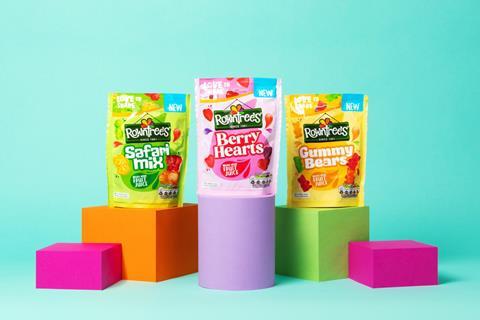
Rowntree’s made its non-HFSS debut in January 2023 with a four-strong range of gummy sweets containing 30% less sugar. But it wasn’t enough to stop the brand feeling at least some of the impact of HFSS rules and evolving buying behaviours. Unit sales are down 9.2%.
70 (95) Fox’s
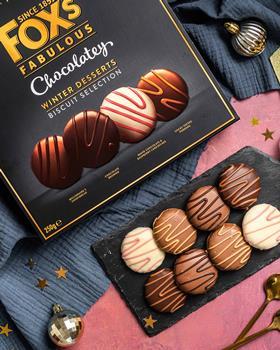
Sales: £148.4m (+32.2%)
The HFSS clampdown on display promotions hasn’t dampened demand for sweet biscuits. It’s merely driven shoppers “into the biscuit aisle itself”, says Fox’s Burton’s Companies. This in turn has helped Brits “rediscover older favourites” like Rocky, which added an Orange SKU in May.
71 (65) Good Boy
Sales: £146.6m (+2.1%)
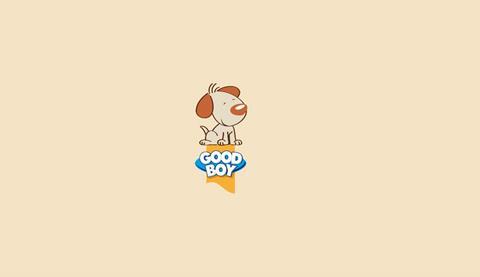
Dogfood and toys brand Good Boy has slipped down the ranking after mustering price-driven growth of just £3m. Units are down 4%. Still, this is only Good Boy’s third year in the top 100. Its minor slip comes after big gains and distribution growth in 2022. It’s not in the doghouse just yet.
72 (69) Ben & Jerry’s
Sales: £145.6m (+7.5%)
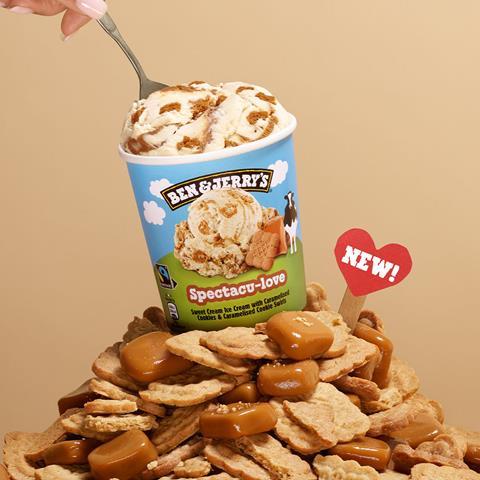
Ben & Jerry’s has kept unit losses down to just 3.9%. Owner Unilever points to the success of the nascent Sundaes range, “which grew 50% in 2023” and “now makes up over 14% of the brand’s sales”. It also added new lines in January: Marshmallow & S’more and Oat of this Swirled.
73 (81) Yorkshire Tea
Sales: £145.0m (+15.9%)
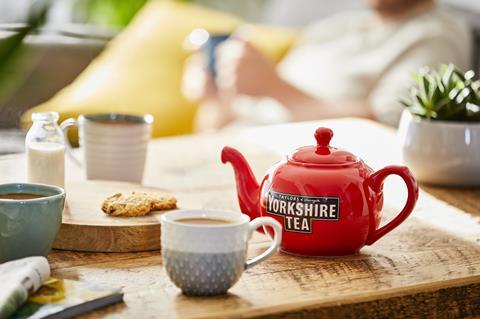
Britain’s bestselling tea continues to grow at a rate of knots. Its £19.9m value gain is largely the result of a 13.4% surge in volumes; average price per pack is up just 2.2%. The brand credits “impactful communications” such as the summer’s ‘Pack Yer Bags’ campaign.
74 (72) Irn-Bru
Sales: £144.6m (+7.2%)
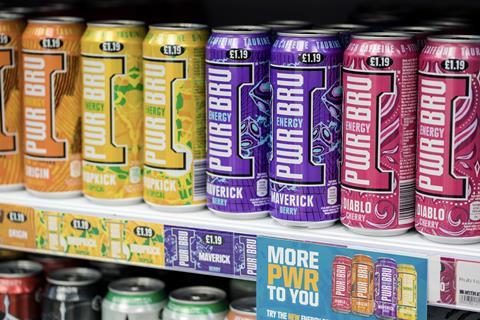
Irn-Bru’s growth this year was driven largely by a 7.1% rise in average price; volumes are up just 0.1%. Inflation is driving “big shifts in shopper buying habits”, admits AG Barr commercial director Jonathan Kemp. But limited editions such as Irn-Bru Xtra Ice Cream continue to “lead to a buzz”.
75 (77) Pot Noodle
Sales: £139.9m (+5.9%)
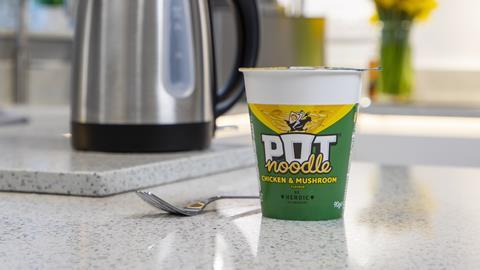
Pot Noodle’s big news of the past year came in July, when it switched from plastic packs to paper for a trial in Tesco.
“Our packaging and manufacturing teams spent three years developing and refining the paper pot,” says Georgina Bradford, marketing director for nutrition at brand owner Unilever.
It’s made with FSC-certified paper and “includes OPRL’s recycling labels that provide clear guidance to shoppers on how to dispose of the packaging”, she adds. Inside the pot, “a single layer of ultra-thin plastic ensures the ingredients remain fresh and protects the paper when water is added but doesn’t inhibit recyclability”.
With volumes down 11.2%, Pot Noodle aims to lure Brits through flavour innovation as well as greener packs. “We’re following up on the success of our consumer-voted Doner Kebab, which sold 2.8 million units in 2023, with another voted-for SKU – soon to be revealed,” Bradford says.
February saw the debut of an ad in which a woman slurps noodles. It’s already sparked so much disgust that official ‘censored’ versions have been released – substituting the offending noise with the likes of a baby’s laugh and a cat’s meow.
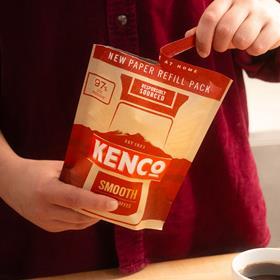
76 (78) Kenco
Sales: £139.7m (+8.3%)
Kenco’s 4.8% volume gain is something of a turnaround after last year’s 23% plunge. Owner JDE credits the brand’s ‘Made To Uplift’ push and NPD including the posh Gold Indulgence instant blend. Such activity – and a 3.3% rise in average pack price – has helped add £10.6m.
77 (86) Aunt Bessie’s
Sales: £133.7m (+13.5%)
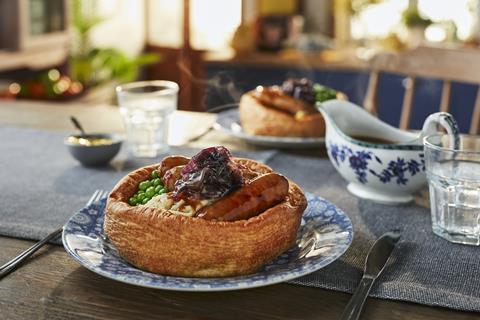
Aunt Bessie’s is back in value growth, but thanks only to a 24.4% hike in average price per pack. That drove a £16m gain despite an 8.7% drop in volumes. To cater for cost-conscious consumers, the brand launched a £12 meal deal in Iceland in January 2023, offering a full roast dinner for four.
78 (90) Ginsters
Sales: £133.5m (+14.9%)
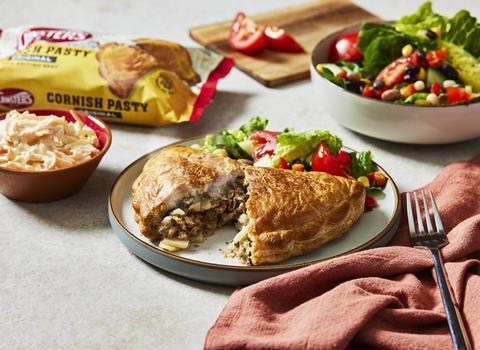
“Ginsters has a firm focus on unlocking long-term category growth and relentlessly recruiting new shoppers,” says marketing director Emma Stowers. To that end, the brand last year added the likes of BBQ Hunters Chicken Slice and kicked off its £4m ‘Taste the effort’ push.
79 (75) Cushelle
Sales: £133.0m (+0.6%)
The UK’s number two loo roll brand has lost 10.1% of its units. Its share is being stolen by market leader Andrex (19) and value-added lines from the likes of Little Duck and Nicky. Cushelle owner Essity says it has a “robust” plan in place, including product improvements.
80 (80) John West
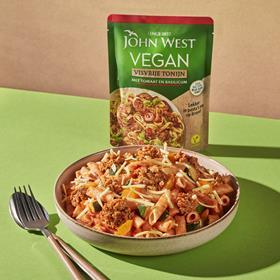
Sales: £132.6m (+4.8%)
Shopper migration to the discounters and own label has driven a 6.1% volume decline for John West. It’s now aiming to push fish’s health benefits and status as the “original natural protein” under a sponsorship partnership with GB Paralympics, announced in early 2023.
81 (82) Flora
Sales: £132.2m (+8.5%)
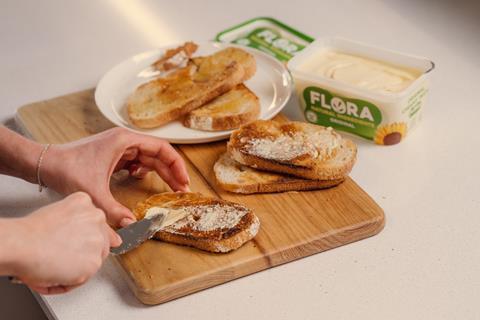
Flora has “shifted gears”, says Ian Hepburn, marketing director at owner Upfield. In September, it unveiled a new look, a big push and a return to being 100% plant-based. That’s “made it easier to shop sustainably” and shown “plant-based doesn’t need to be a byword for bland”.
82 (64) Comfort
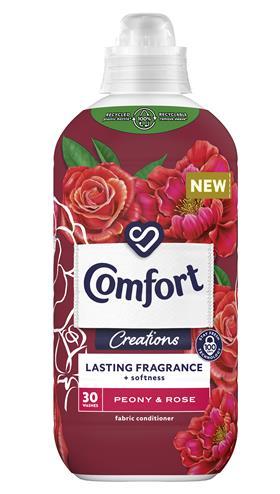
Sales: £131.9m (–9.8%)
Comfort “continues to tap into shopper insight to bring relevant products to market”, says owner Unilever, pointing to last year’s Peony & Rose Fabric Conditioner. With volumes down 19.2%, the brand will this year bring out “new products that have a definitive place within the market”.
83 (67) Anchor
Sales: £129.2m (–6.3%)
Anchor has slid down the ranking due to an £8.7m loss. Volumes are down 3.9% despite a 2.5% cut in average unit price. Owner Arla stresses performance is now “significantly improving” after downsizing 250g blocks to a cheaper 200g in summer. “Key innovation” is set for later this year.
84 (73) Kleenex
Sales: £128.2m (–4.6%)

Kleenex is one of only 16 top 100 brands to have seen value slip. But its volumes are up 5%. The reason began in 2022, when own label faced supply constraints and Kleenex bagged extra market share. As own label recovered in 2023, Kleenex stepped up promotions to maintain unit sales.
85 (94) Philadelphia
Sales: £128.2m (+14.1%)
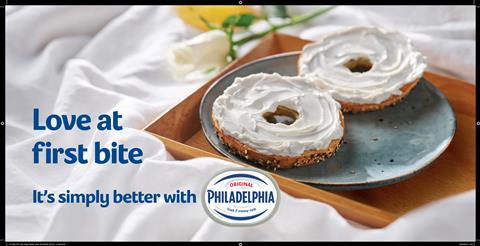
Philadelphia has seen 2.7% volume growth due to Brits “opting to make lunch at home as a way of saving money”, says Susan Nash, trade comms manager at owner Mondelez. The brand’s snacks have enjoyed value gains above the category average thanks to being low cal and low fat.
86 (107) Silver Spoon
Sales: £125.5m (+27.7%)
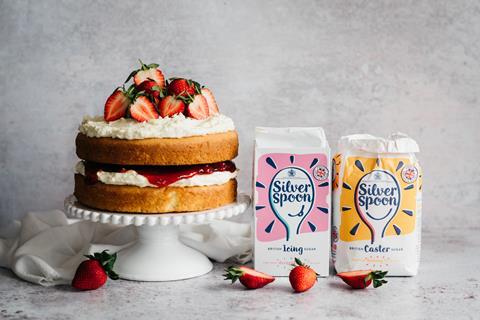
Soaring prices have catapulted Silver Spoon into the top 100. The brand’s 34.6% hike per average pack is the biggest in this report – reflecting major input cost inflation. But it has depressed volumes, which are down 5.1%. Silver Spoon hopes to re-energise unit sales with new home baking lines.
87 (76) Princes
Sales: £124.1m (–6.0%)
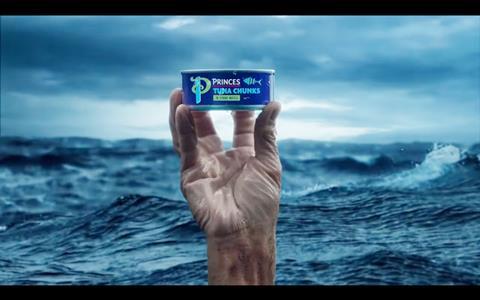
Branded ambient grocery has been at the sharp end of consumer downtrading, and Princes has felt the full force.
The ambient brand has shed £8m after selling 9.4 million fewer packs – a decline driven in part by a 10.8% rise in average price per unit.
“With inflated grocery prices, consumers have looked to trade down to own label products in some areas,” says Jeremy Gibson, Princes marketing director.
“However, we’ve worked to mitigate this risk with a year of transformation across the brand.”
Most notably, it invested £2m in its ‘Fish for Greatness’ campaign to stress the quality and responsible sourcing credentials of its tuna.
And the brand’s wider fish offer focused on cost-conscious shoppers, increasing availability in B&M, Lidl and Home Bargains.
A focus on convenience helped Princes underpin volume growth in canned fruit, as Brits used it for home baking. Multibuy offers in smaller convenience stores helped drive this trend.
Trading across the brand is now on the upturn, says Gibson. It’s seen an uptick in recent weeks for core parts of its portfolio.
88 (84) Old El Paso
Sales: £123.9m (+3.7%)
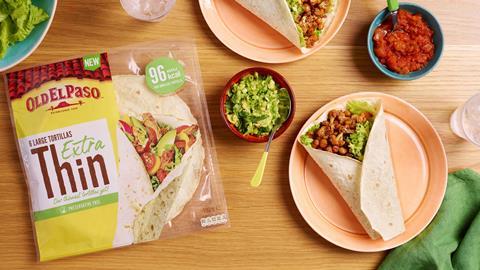
In the face of a 5.8% volume fall, Old El Paso has been innovating. Burrito Bowl Kit kicked off an NPD drive in July; Extra Thin Tortillas landed in August. The following month, the brand teamed up with Samworth Brothers for an eight-strong range of Old El Paso chilled ready meals.
89 (89) Oatly
Sales: £123.5m (+6.1%)
Oatly has been bolstered by the loyalty of shoppers at the premium end of alt milk, says UK GM Bryan Carroll. Barista Edition “continues to sell twice as much as its next closest competitor”, he adds, and launches such as May 2023’s Semi and Light have been key drivers of value growth.
90 (93) Peperami
Sales: £120.5m (+6.6%)
Peperami is more than just sticks of meat – as illustrated by its Pizza Bun. Unveiled last April in Original and Hot, it’s a bready pocket filled with salami, cheese and tomato & herb sauce. Billed by the brand as a “one-of-a-kind product”, it joined a portfolio that’s down 3.5% in volume sales.
91 (83) Ben’s Original
Sales: £119.6m (–0.3%)
In early 2023, Ben’s Original shrank its ready-to-heat rice pouches from 250g to 220g, while keeping rsps the same. The Mars brand has since suffered a 9.3% slump in units and lost share to markedly smaller rival Tilda, which has been pushing larger, better value packs.
92 (91) Finish
Sales: £119.3m (+2.7%)
Dishwasher tablet brand Finish has seen 9.8% of its unit sales go down the drain as own label makes strong gains in the category. That’s despite the March 2023 launch of Finish Ultimate Plus – its “best innovation yet”, which had been “years in the making”.
93 (79) Kingsmill
Sales: £117.3m (–9.1%)
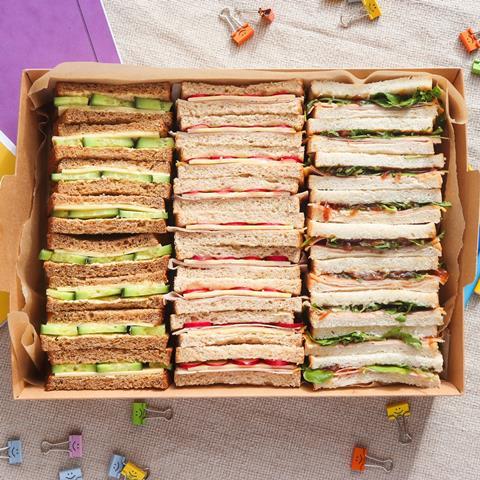
Kingsmill has tumbled down the top 100 with an £11.7m loss. It’s the result of long-term structural challenges in wrapped bread combined with vicious inflation, as bakeries contend with higher costs for energy and ingredients.
An 18% uptick in average price per pack mitigated the impact of a 22.9% dive in volumes, driven by cost-conscious Brits trading down to own-label lines.
That same pressure has switched up retailer spend, says Emma Eggleton, head of marketing at Kingsmill owner Allied Bakeries. The squeeze on household incomes has made Aldi the second-biggest retailer in bakery goods by units, she adds.
So the extra listings for its ‘healthier’ white loaf in Aldi and Lidl – as well Morrisons –are undoubtedly good news.
What’s more, Kingsmill’s 50/50 loaf is the third-biggest seller in bakery, bought regularly by more than four million households.
It’s perhaps one reason why Allied remains “extremely positive” about Kingsmill’s future, despite the increasingly commoditised nature of the bread category. Fresh bread plays a central role in the lives of millions of households, Eggleton sums up.
94 (85) Duracell
Sales: £117.0m (–1.9%)
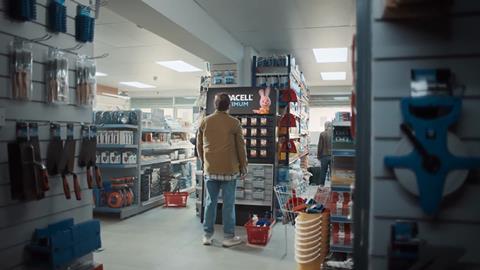
Duracell is striving to keep Brits away from own-label batteries. Its ad last summer showed a dad disappointing his family by trading down. “The premise of false economies is something that seems to resonate strongly with shoppers as they get savvier in how they spend,” says the brand.
95 (88) Ribena
Sales: £116.3m (–0.7%)
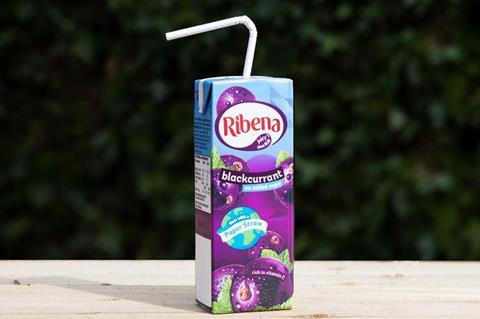
In June, Ribena’s “iconic bouncing berries” returned to TV screens after 10 years, as part of a ‘Summer of Fun’ push to celebrate the brand’s 85th anniversary. Owner Suntory Beverage & Food GB&I insists spotlighting Ribena’s “provenance and heritage” will ensure it remains relevant.
96 (96) Pizza Express
Sales: £114.3m (+3.1%)
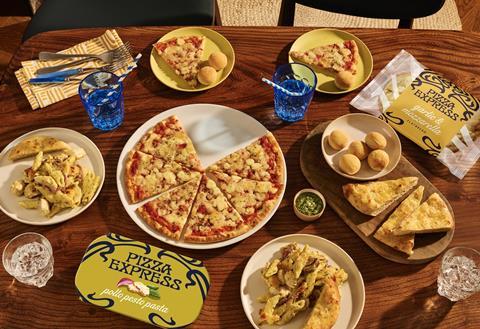
Unit sales of the Pizza Express retail range are in decent shape – down just 1.3%. September saw a major refresh for its chilled range. That was followed in November by a quartet of frozen pizzas exclusively for Tesco – “designed to bring pizzazz to the nation’s freezers”, says the brand.
97 (104) Dolmio
Sales: £114.1m (+13.2%)
Mid-tier cooking sauce brands are fighting on two fronts. They’re being undercut by own-label alternatives and out-innovated by branded challengers that claim to offer restaurant-quality lines. Faced with an 11.8% unit decline, Dolmio last year launched its “bolder” Intensify range.
98 (92) Vimto
Sales: £113.7m (+0.2%)
Vimto’s in danger of dropping out of the top 100. Value sales are more or less flat – up just £282.5k – while volumes have dived 10.7%. A long-mooted move into energy drinks came to fruition in September when the brand launched caffeinated versions of its core sparkling options.
99 (113) M&M’s
Sales: £113.5m (+20.3%)
M&M’s has made its top 100 debut thanks to the strongest unit growth of any choc brand in this report. It’s shifted an extra 3.6 million packs and added £19.1m. Owner Mars Wrigley has invested in PoS marketing – such as pick ‘n’ mix displays in Asda – to make fixtures a destination.
100 (110) Ambrosia
Sales: £111.7m (+16.3%)
Premier Foods has been busy expanding Ambrosia beyond its core custard and rice pudding offer. Its ready-to-eat porridge pots were the “standout performer” in 2023, says Daniel Jalalpour, marketing director for desserts. But the £15.6m value gain masks a 10.9% decline in volumes.
Downloads
M and M
Image, Size 21.6 mbVimto
Image, Size 9.01 mbQuorn Deli Opening Shot
Image, Size 7.91 mb
Where next for Britain’s Biggest Brands?
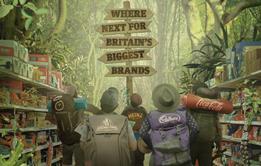
As cash-strapped shoppers turn to own label, brands are innovating to win them back. But danger lurks for those who fail to pitch their NPD astutely
- 1
 Currently
reading
Currently
reading
Britain’s Biggest Brands 2024: The top 100
- 3
- 4
- 5












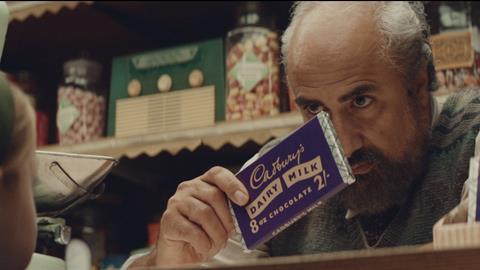




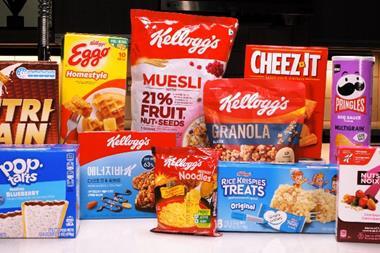
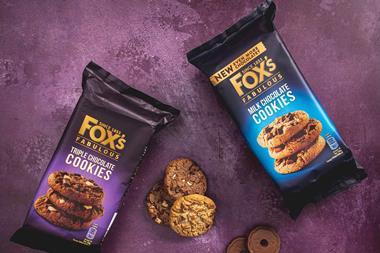
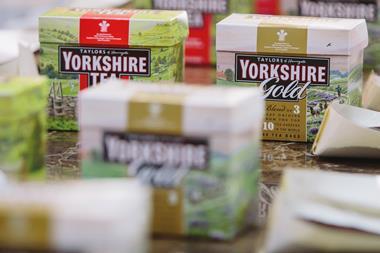
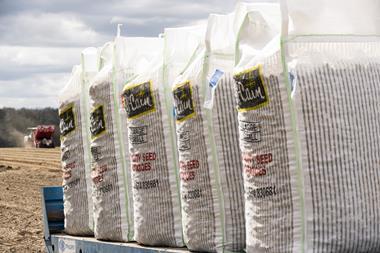

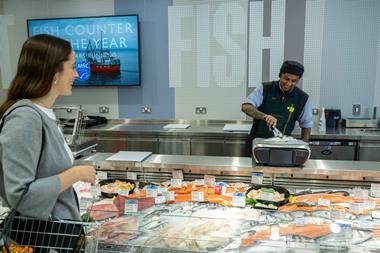
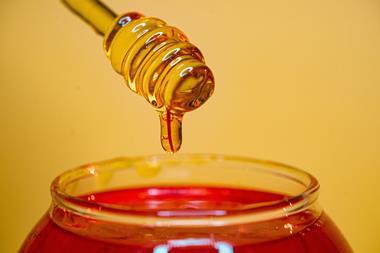
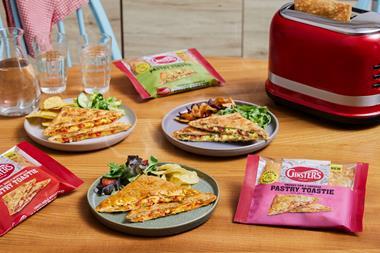
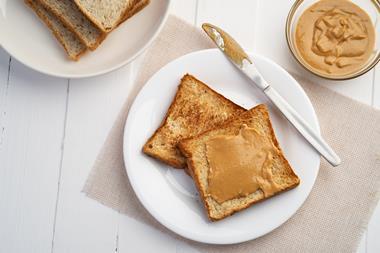
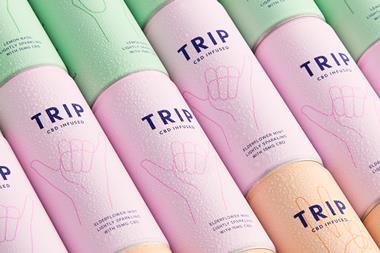
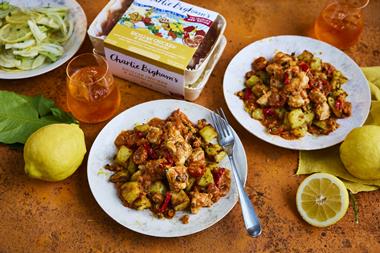
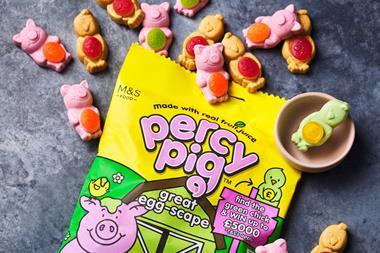
No comments yet